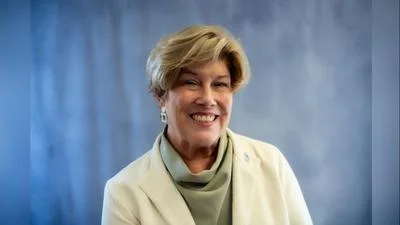Desi Anderson, Republican candidate for State Senate IL District 46 | Provided Photo from Desi Anderson
Desi Anderson, Republican candidate for State Senate IL District 46 | Provided Photo from Desi Anderson
With high inflation rates affecting consumers nationwide, state level politicians and candidates in Illinois are speaking up. Many of the Republican candidates slated for the November election believe that Springfield should be looking to provide long-term relief to consumers, rather than stints of alleviation during times of economic hardship. In the last four months, elected officials in Illinois have made strides to keep money in the pockets of consumers through a series of tax freezes and suspensions. To many Republican candidates, these are election year gimmicks and if the current representation is re-elected the status quo of poor credit ratings caused by budgeting issues will continue.
"Despite gas prices slightly decreasing, Illinoisans are still paying more for groceries than they ever have," Desi Anderson, candidate for Illinois State Senate District 46, said in a statement. "It’s no wonder why so many people are leaving Illinois – they continue to get hit from every side as they are trying to work and provide for their families, and some are still recovering from the extreme economic shutdowns during COVID."
Anderson said Illinois residents need a solution.
"As Democrats in Springfield falsely help out consumers during an election year, the people of central Illinois need a serious fix to this ongoing issue. I call on the majority in the state legislature to eliminate the state’s grocery tax so Illinois families can stop drowning in high prices and taxes. It’s time for the 46th District to have a representative that will fight to make Illinois more affordable," she said.
It was announced in June that as a part of Gov. J.B. Pritzker's plan to combat soaring prices, the grocery tax of 1% in Illinois would be suspended from July 1 until June 30, 2023. Newsweek reported that the year-long tax suspension will save taxpayers up to $400 million, even though the state would not be lifting the 1% tax levy on medicine and hygiene products.
The U.S. Bureau of Labor Statistics reported that over the past 12 months, the Consumer Price Index (CPI) for food is at 11.4%. To further break down that percentage change, food at home has increased 13.5% and food away from home has increased 8.0%.
Illinois Policy provides a broader view of the effects of inflation reporting in June that the average private-sector worker in Illinois is experiencing what is really a pay cut. Over the last 12 months, those in the private-sector saw a pay bump of more than $3,408, however, to keep up with cost of living the rise in wages needs to be $5,635.
Currently, Illinois is one of 13 states that taxes groceries. The others are Idaho, South Dakota, Utah, Kansas, Oklahoma, Missouri, Arkansas, Tennessee, Mississippi, Alabama, Hawaii and Virginia. Four of these states – Hawaii, Oklahoma, Idaho and Kansas – have state tax credit that partly offsets the cost of tax helping lower income families. The Center on Budget and Policy Priorities reported that sales taxes on groceries have a significant impact on low-income families as they spend more of their income on groceries. By income, the lowest 20% spend 10.3% on food at home while the highest 20% only spend 5.7%.
Tax Foundation researcher Jared Walczak reported that sales taxes are more economically efficient, compared to other methods of taxation, as they are "more stable and pro-growth." Walczak’s reasoning is that sales "tax does less to influence economic decision-making and does not directly tax labor or investment." When sales tax is the main method of state revenue, households are more likely to set aside money for the future while also providing the state with a more stable revenue stream. Another point made was that grocery taxes do scale with income as higher income families will purchase larger quantities of high quality food and lower income families will purchase based on need. However, an important component to this is tax credits targeted at low-income households.
The Tax Foundation has Illinois ranked at 13th in the nation for income tax and shows that the state does not provide recurring tax credits to low-income families which would suggest that suspending the grocery tax in Illinois is a short-term solution to rising costs.
Anderson is a small business owner with her husband Nick and mother to a 1 year old. Most will find it hard to relate to her upbringing as she was abandoned as a baby in the Eastern Bloc of communist Europe in Bulgaria. She went on to graduate from Indiana University with a double major degree. Anderson’s goal now is to be a unifying voice in elected office and fight back against the political corruption that has taken hold in Illinois.





 Alerts Sign-up
Alerts Sign-up